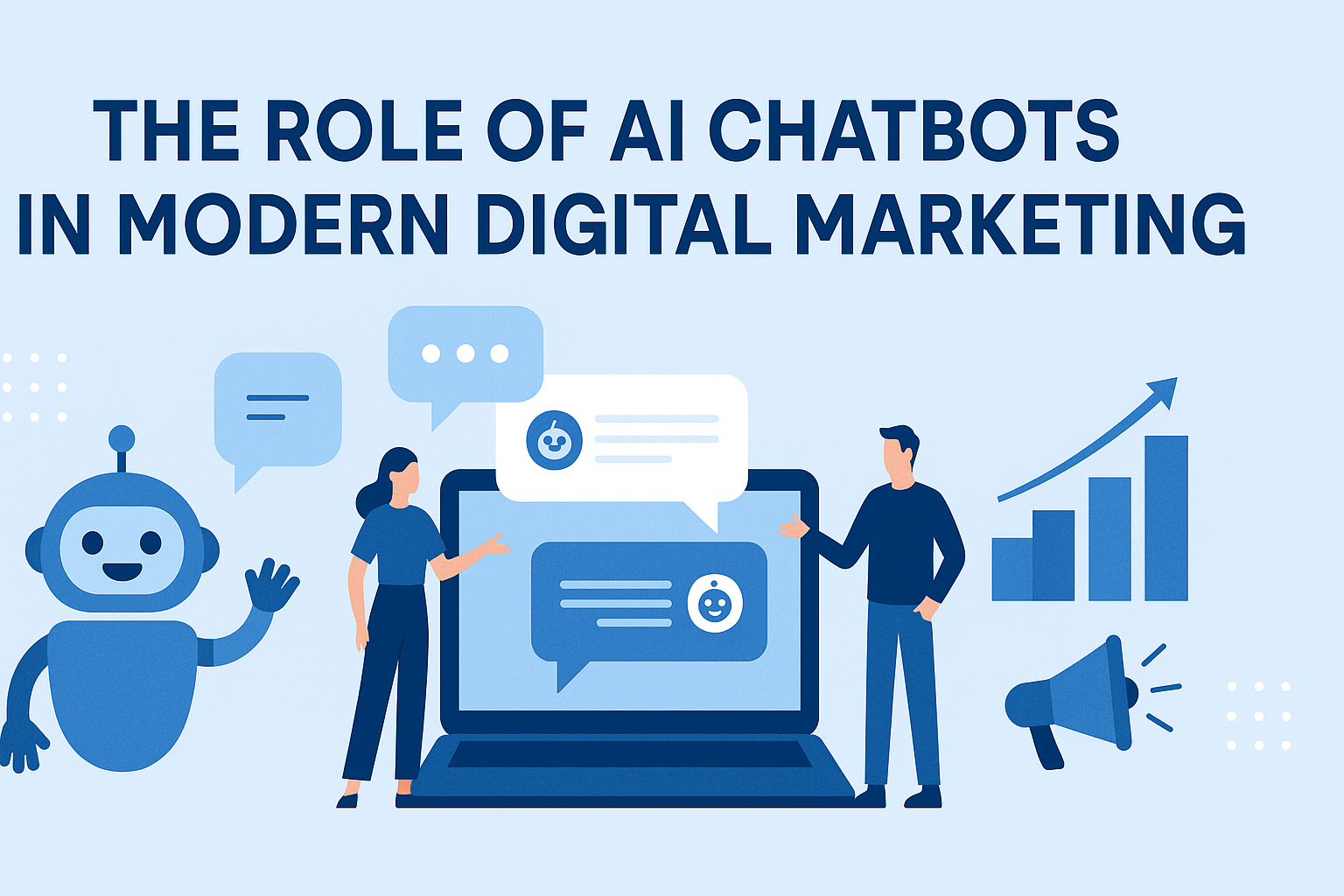The Role of AI Chatbots in Modern Digital Marketing

Digital marketing has evolved rapidly over the past decade, but few innovations have been as transformative as AI chatbots. These intelligent conversational tools are reshaping how businesses interact with customers, generate leads, and drive sales. From instant customer support to personalized shopping experiences, AI chatbots are becoming essential components of successful marketing strategies.
This post explores the growing role of AI chatbots in modern digital marketing, examining their key applications, benefits, and what the future holds for this technology.
What Are AI Chatbots?
AI chatbots are automated conversational tools powered by artificial intelligence that can simulate human-like interactions with users. Unlike basic rule-based bots that follow pre-programmed scripts, AI chatbots use natural language processing (NLP) and machine learning to understand context, interpret user intent, and provide relevant responses.
These intelligent systems can be deployed across various platforms, including websites, social media channels, messaging apps, and mobile applications. They operate 24/7, providing instant responses to customer queries whilst learning from each interaction to improve future conversations.
Why AI Chatbots Matter in Digital Marketing Today
Consumer expectations have shifted dramatically. People want immediate responses, personalised experiences, and seamless interactions across all touchpoints. AI chatbots address these demands by providing instant, round-the-clock engagement that traditional marketing methods simply cannot match.
The numbers speak for themselves: businesses using chatbots report significant improvements in customer satisfaction, lead generation, and conversion rates. More importantly, chatbots free up human resources to focus on complex, high-value tasks whilst handling routine inquiries automatically.
Key Use Cases of AI Chatbots in Digital Marketing
1. Lead Generation & Qualification
AI chatbots excel at capturing and qualifying leads through interactive conversations. Instead of static contact forms, chatbots engage visitors with dynamic questions, gathering essential information whilst providing immediate value. This conversational approach often yields higher completion rates than traditional forms.
2. Customer Support Automation
Chatbots handle common customer inquiries instantly, reducing wait times and improving satisfaction. They can resolve frequently asked questions, guide users through troubleshooting steps, and escalate complex issues to human agents when necessary.
3. Conversational Commerce in eCommerce
In online retail, chatbots act as virtual shopping assistants, helping customers find products, compare options, and complete purchases. They can provide personalized recommendations based on browsing history and preferences, creating a more engaging shopping experience.
4. Nurturing Leads via Chat Funnels
Chatbots can guide prospects through structured conversation flows, delivering targeted content and offers based on user responses. This approach creates personalised nurturing sequences that adapt to individual interests and behaviours.
5. Retargeting Website Visitors
Smart chatbots can identify returning visitors and re-engage them with personalised messages based on their previous interactions. This proactive approach helps recover potentially lost leads and encourages conversion.
How AI Chatbots Improve Marketing Metrics
AI chatbots directly impact key marketing performance indicators. Response times drop from hours to seconds, improving customer satisfaction scores. Lead capture rates often increase as chatbots provide more engaging alternatives to static forms.
Conversion rates benefit from personalised, real-time assistance throughout the customer journey. Chatbots can address objections, provide additional information, and guide users towards desired actions. Additionally, the data collected through chatbot interactions provides valuable insights into customer preferences and pain points.
AI Chatbots vs Traditional Marketing Tools
When comparing AI chatbots to conventional methods like contact forms, the advantages become clear. The AI chatbot vs contact form debate often centers on engagement and conversion rates, where chatbots consistently outperform static alternatives.
Traditional marketing tools typically offer one-way communication, whilst chatbots create interactive dialogues. This fundamental difference leads to higher engagement rates, better user experiences, and more qualified leads.
Future of AI Chatbots in Digital Marketing
The future of AI chatbots in marketing looks increasingly sophisticated. Advances in natural language processing will make conversations more human-like, whilst integration with other marketing technologies will create seamless omnichannel experiences.
Voice-activated chatbots, predictive analytics integration, and enhanced personalisation capabilities are on the horizon. As AI technology continues to evolve, chatbots will become even more intelligent and capable of handling complex marketing tasks.
Embracing the Chatbot Revolution
AI chatbots represent more than just a technological upgrade—they're a fundamental shift towards more personalised, efficient digital marketing. Businesses that embrace this technology now will have a significant advantage as customer expectations continue to evolve.
The question isn't whether to implement AI chatbots, but how quickly you can integrate them into your marketing strategy. Start by identifying your most common customer interactions and consider how chatbots could enhance these touchpoints. The future of digital marketing is conversational, and AI chatbots are leading the way.
- Art
- Causes
- Crafts
- Dance
- Drinks
- Film
- Fitness
- Food
- Games
- Gardening
- Health
- Home
- Literature
- Music
- Networking
- Other
- Party
- Religion
- Shopping
- Sports
- Theater
- Wellness


